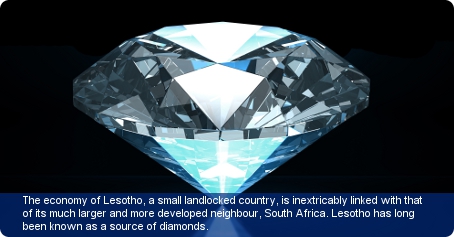Find a business in Lesotho

Lesotho is a small, landlocked country surrounded on all sides by South Africa. Its economy is inseparably linked to its developed neighbour, as most of the county’s income comes from the Southern African Customs Union import tariffs. It has a GNI per capita of US$1,380 (2012) and has seen GDP growth of 5% per annum in 2008-12. Encouragement of the manufacturing sector saw it rapidly grow in the 1980s and 1990s, but in the 2000s its share of GDP fell to 16% (2010). The state is self-sufficient in electricity and is providing income by supplying South Africa with water from the Highlands Water Development Project.
The country is very mountainous which presents challenges to its predominantly agricultural economy. As well as foreign earnings coming from its share of import duties earned in the Southern African Customs Union, remittances from its citizens (mainly mineworkers) working in South Africa provide substantial income. As the number of miners working in South Africa has steadily declined over the past decade, the country has developed a small manufacturing base centred largely around adding value to farm products. These include leather goods, canning, footwear, milling, and the jute industry.
Manufacturing contributes around 18% of Lesotho’s GDP (2007). Manufacturing is based largely in and around the capital, Maseru. The Government has encouraged foreign direct investment in manufacture of textiles, clothing and footwear to take advantage of preferential trade arrangements with the USA. Despite Lesotho’s market-based economy being heavily tied to its neighbour South Africa, the US is an important trade partner because of the export sector’s heavy dependence on apparel exports.
The construction industry directly contributes 14% of GDP (2007). The first phase of the Lesotho Highlands Water Project led to a large spike in construction during the 1990s. A further spike could be expected in the 2010s if the second stage were to proceed.
Agriculture, forestry and fisheries together contribute 8% of GDP (2010). Agriculture is mostly on a small scale though there is some commercial farming. Being mostly mountainous, the country is more suited to livestock than arable farming, but production is constrained by the irregular pattern of rainfall.
The most important mineral found in the country is diamonds. Although diamonds occur in very small quantities, they tend to be unusually large, many weighing more than 10 carats.
As a landlocked country Lesotho’s only access to the sea is via South Africa, the nearest and most important port being Durban, which can accommodate deep-sea ro–ro ships. The country’s capital and business centre, Maseru, is linked to Durban by rail and road. The country’s main airport, Moshoeshoe I International Airport, is located 20 km south of Maseru.
Lesotho is ranked 10th best in the Sub-Saharan African region for paying taxes, according to the World Bank’s ‘Doing Business 2012’ study. These rankings measure the conduciveness of a regulatory regime in starting and operating a business.
Lesotho has an 75.8% adult literacy rate (2009). English is generally used in professional and business life. About 4% of the relevant age group is enrolled in tertiary education (2006). The majority of people live in rural areas and farming is the chief occupation. Some 50,000 people are employed in manufacturing. Many used to work on the Highlands Water Project, but after completion of the first stage in the mid-2000s only a few hundred were retained. A further 50,000 migrant workers are employed in the South African gold mines.



